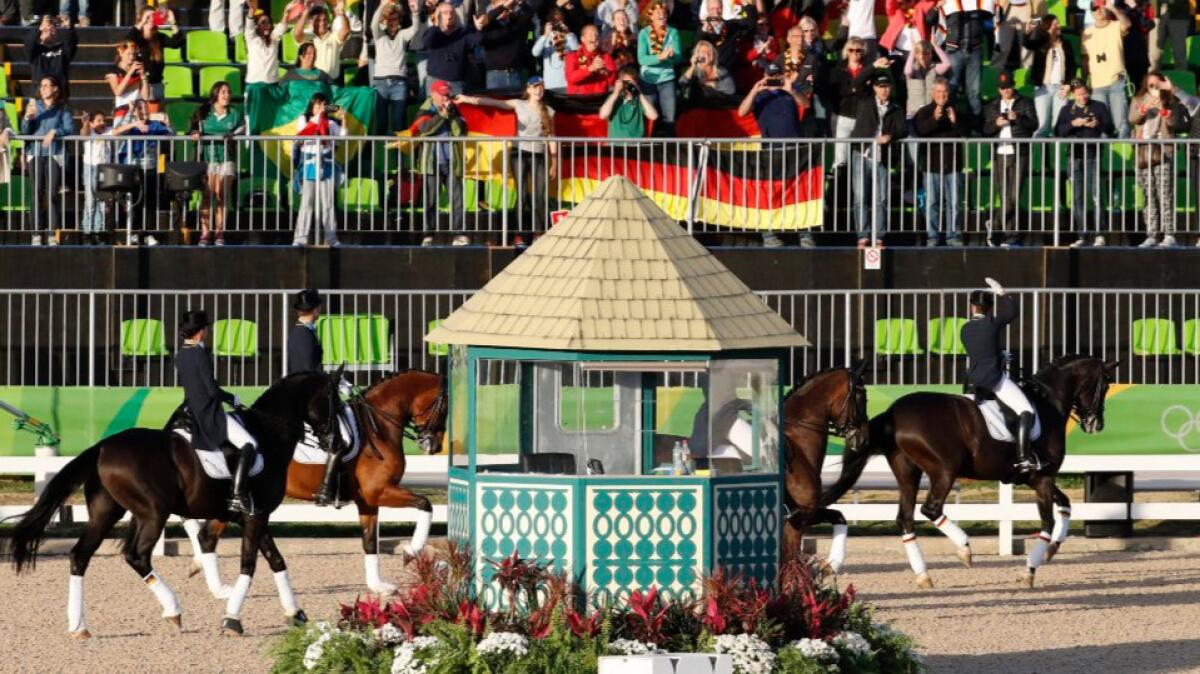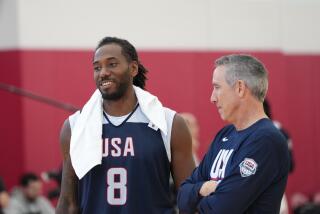Horses are living the good life at the equestrian village

Their accommodations are spacious and well-constructed. They have a full-time staff catering to their needs and enjoy daily massages. They dine on food flown in especially for them.
In short, Olympic horses may be living better than anyone at the Rio Games.
“The accommodations here are pleasantly surprising,” said Rick Mitchell, veterinarian for the U.S. dressage team. “Our horses are not complaining about anything.”
The Rio Olympics have largely become the Good Enough Games, with scaled-back venues and reduced services becoming the obvious rule. Shortcuts can be seen everywhere, including the athletes’ village, where in the lead-up to the games, teams were forced to deal with plumbing problems, unfinished construction work and even a lack of coffee.
But the Deodoro Equestrian Center, the four-legged athletes’ village in the western part of the city, appears to be the exception as riders and support team members have raved about the conditions. Only U.S. basketball team members — who are staying on a luxury cruise ship anchored in Guanabara Bay — have praised their accommodations more.
“The facilities have been great,” said Lauren Kieffer, an eventing competitor from Illinois. “They couldn’t have been any better set up for us.”
It also brought results as the U.S. team won the bronze medal in the dressage team results. Germany won the gold followed by Britain.
The U.S. equestrian team has brought 15 horses to the Games, four competitors and an alternate for each of the three riding disciplines. They’re all stabled in a state-of-the-art complex that includes a bathing center, medical facility and shoe shop.
The horses sleep in newly constructed 170-square-foot stalls, with dimmer lights and filtered watered flavored to their tastes. The equine athletes — as they are called here with great deference — have American flags hanging outside their accommodations, something their riders are warned against doing for safety reasons in human athletes’ village.
Every effort is made to make the facility as home-like as possible for the equine athletes, who thrive on routine. When they travel overseas they drink filtered water flavored with a Gatorade-like electrolyte booster so the water will taste the same regardless of what country they’re in.
They have their own personal grooms, who arrive about 6 a.m. each day to feed, clean and take them for a walk. They get a morning checkup from Mitchell, a daily visit that brings some of the horses to the front of the stalls in the hopes of getting a sugar cube and others moving toward the back in fear that they may need blood drawn.
Each horse on the U.S. team has a sweet tooth, indulged regularly with sugar cubes, apples and mints. A few love chocolate, but they can’t have it here because it contains theobromine, a naturally occurring stimulant that is banned under international doping rules that are stricter for horses than humans. The U.S. Equestrian Federation says the horses’ chocolate cravings are satisfied instead with carrots, something that rarely works with humans but apparently does the trick for equines.
“The horses’ personal needs, in some cases, are as important as their professional needs,” said farrier Kenny Bark, who trims and shoes hooves for the dressage and jumping teams. “If the horses aren’t happy in their personal lives, they’re not going to perform well.”
And it’s not just the horses that benefit from having the best digs in western Rio. It also does the riders good to know that their horses are being treated well — because their own success relies heavily upon the equines’ physical and emotional health. Mitchell said a big part of his job is assuring the riders and coaches that the horses are doing well.
“If the riders’ mind isn’t where it needs to be because he or she is not confident that their horse is up to par, then they’re not going to necessarily perform as well as they can,” said Mitchell, who’s marking his sixth Olympics as a Team USA veterinarian.
Indeed, it’s a stressor that most competitors here don’t face. With the exception of the modern pentathletes, no other athletes have a four-legged animal’s well-being on their Olympic priorities list.
“It can actually be a good thing,” Kieffer said. “Sometimes, it’s good to have someone to worry about beside yourself.”
On non-competition days, the riders visit with their equine partners before training sessions and then spend time afterward going over the horses’ condition with an team that includes a veterinarian, farrier, physiologist, the horses’ owner, trainers and coach. All totaled, each horse has at least a half-dozen people in Brazil looking out for its best interests and about the same number of people back home who receive daily updates by phone and text message.
It’s an informal atmosphere, where the horses go by stable nicknames instead of their fancier competition monikers. For example, Verdades, the 14-year-old gelding who competed with Laura Graves in the dressage, goes by “Diddy,” while Steffen Peters’ Legolas — named for an elf in J.R.R. Tolkien’s “Lord of the Rings” books — simply goes by “Legs.”
The horses receive daily massages and some have acupuncture treatments included in their health regimen. They eat at least three meals a day, mostly cooked grains flown in from the United States so as not to have their diets disrupted. Some of their hay was purchased in Brazil because of customs regulations.
The grooms leave about 10 each night, when security arranged by the international federation takes over.
Several U.S. horses had been training in Europe in the lead-up to the Olympics and flew in from Belgium more than a week before the competition, so they would have time to recuperate from jet lag before the competition began. Along with nearly two dozen horses from 11 countries, they traveled on a Boeing 777 for the 11-hour flight to Rio.
There were two veterinarians onboard in case of an emergency, and the U.S. team also sent a groom to tend to the equine athletes’ in-flight needs. Each horse’s carry-on luggage was limited to a large hay net, 40 liters of water, a personal bucket, a rug to ward off the chill and a small overnight bag with a spare headcollar.
They landed in Rio around midnight to find team officials waiting for them — yet another move intended to acclimate the horses to Brazil as soon as possible.
“It’s important that they arrived to friendly faces,” Bark said.
Even with effort to create a sense of normalcy for the horses, both Bark and Mitchell said the equine athletes can sense some different about this competition. There’s an energy around the complex that everyone can feel — including the horses.
“Oh, they absolutely know something is going on,” Mitchell said. “This isn’t your ordinary horse show.”
Follow Stacy St. Clair on Twitter @stacystclair
More to Read
Go beyond the scoreboard
Get the latest on L.A.'s teams in the daily Sports Report newsletter.
You may occasionally receive promotional content from the Los Angeles Times.






